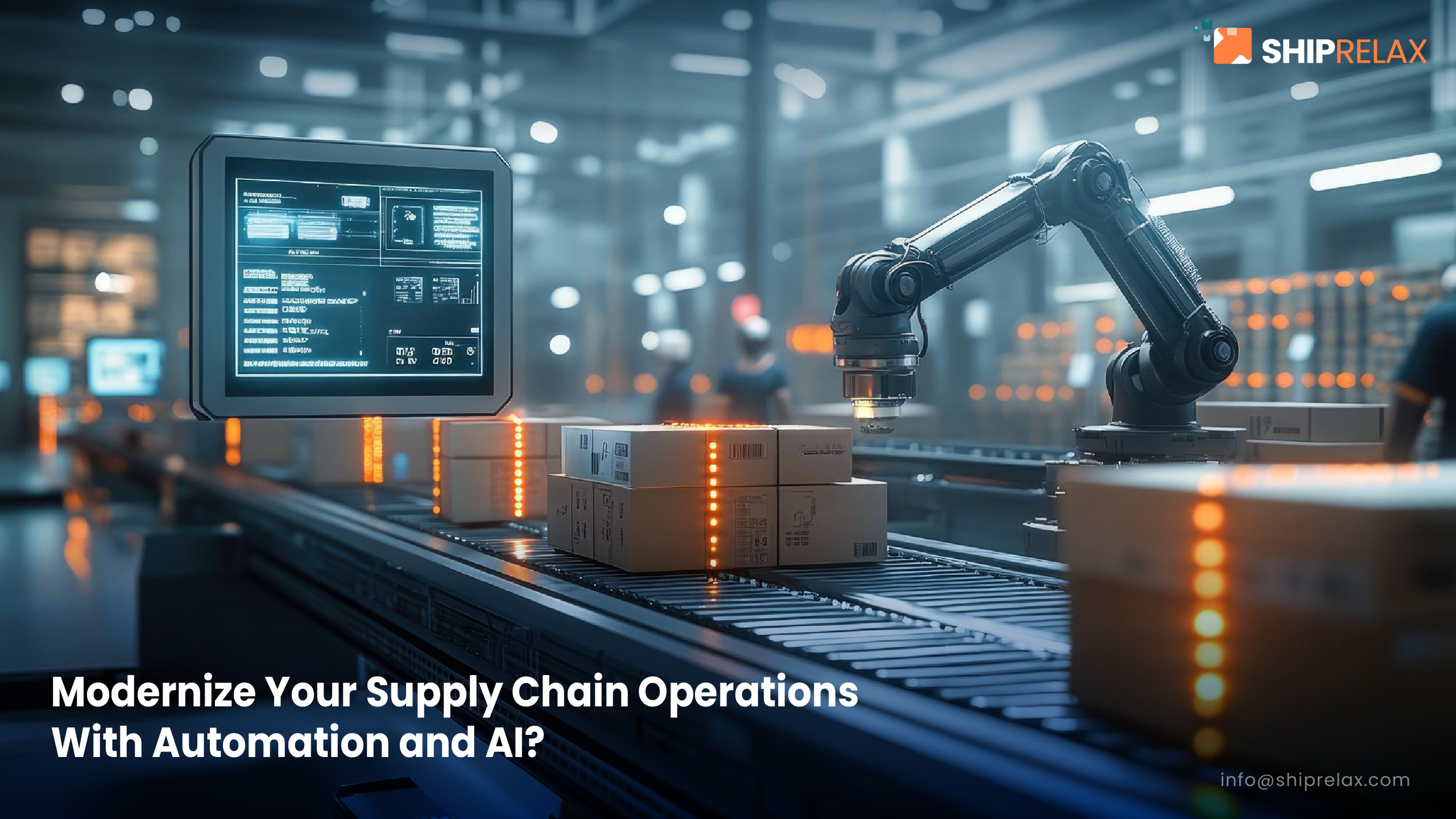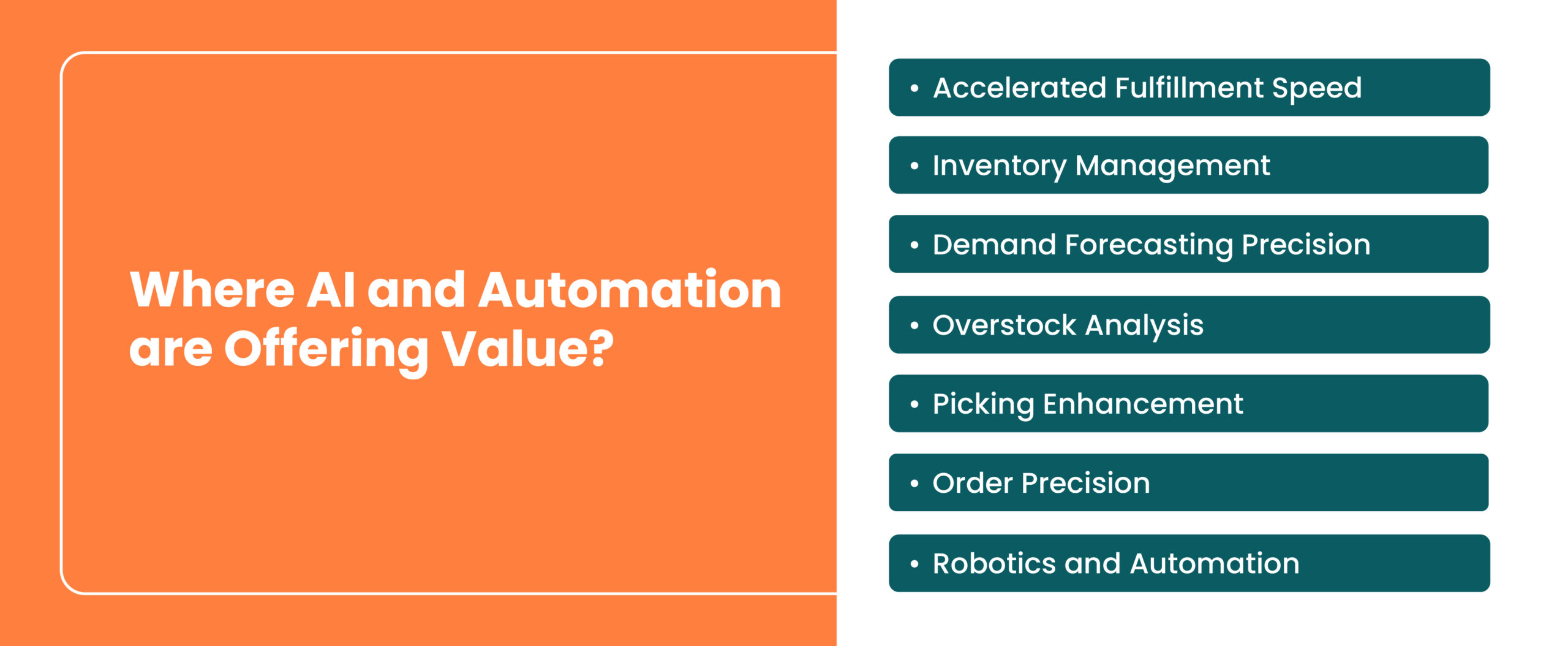
Automation and AI are astonishingly modernizing warehousing, logistics, and supply chain processes, boosting business productivity, intelligent forecasting and planning, and data-driven decision-making. To make the best use of these technologies, companies are constantly seeking a perfect inventory and warehouse management solution that enables them to manage the entire supply chain process effortlessly. The unique combination of a dedicated 3PL expert and a 3PL WMS in the US is helping brands simplify and streamline complex logistics, warehouse, inventory, order processing, and supply chain processes.
What is AI and Automation in Logistics?
AI and automation play a prominent role in reimagining supply chain operations by analyzing routes, enhancing delivery speed, and smarter demand forecasting, and others. Investing in these technologies enables organizations to grow intelligently and efficiently. AI-enabled automation in logistics and supply chain is no longer a groundbreaking concept; it is already being utilized by reputed e-commerce brands, retailers, manufacturers, distributors, and other sectors to refine and strengthen warehouse, logistics, and supply chain functions.
An AI-powered warehouse management solution is being leveraged for a number of reasons, such as forecasting demands smartly, strategic shipments planning, warehouse simplification, clear route visibility, monitoring freight conditions, identifying potential risks, and several other factors. AI algorithms assist companies in analyzing transit times, simplifying carrier selection, and monitoring alternate routes and carriers. It even helps automate some aspects of your customer service tasks like scanning customer complaints or queries and resolving these with great accuracy and speed, gradually elevating your customer experience.
Where AI and Automation are Offering Value?

AI and automation in logistics are reimaging the supply chain operation in several ways by going beyond real-time route optimization or speeding up logistics and warehouse processes. The AI-driven WMS software is not just facilitating organizations to keep up but to leap ahead with improved delivery times, boosted customer satisfaction, informed decision making, carrier analysis and other features.
- Accelerated Fulfillment Speed: AI-enabled WMS platform expedites fulfillment speed by analyzing historical demand data, warehouse layouts, worker routes, and refining warehouse processes. Additionally, the AI in logistics can be leveraged to evaluate whether delivery containers are effectively packed, reducing shipping inaccuracies and wasted space.
- Inventory Management: The ideal fulfillment software allows the logistics team to figure out incoming orders with anticipated fulfillment times that may exceed their targets. By recognizing these at-risk orders early, managers can give priority to picking so as to rearrange item stocking locations to group frequently ordered products together. Also, generative AI is tailored to summarize order revision histories and create email acknowledgements automatically for new or updated orders, enhancing communication and reducing manual efforts.
- Demand Forecasting Precision: AI-driven demand forecasting enhances the ability to spot potential delivery delays of finished goods. The valuable insights offered allow logistics managers to prioritize shipment of high-impact products, increasing customer satisfaction and revenues.
- Overstock Analysis: AI-based predictive analytics enable manufacturers to maintain optimal inventory levels. By combining historical data and demand data, these tools support informed decision-making to prevent stockouts and reduce the volume of excess inventory, ultimately improving cash flow and storage efficiency.
- Picking Enhancement: AI helps streamline product picking by identifying order patterns and items that are frequently purchased together. Moreover, AI-enabled demand forecasting can help strategize the placement of products in the most accessible warehouse areas with earlier delivery deadlines, such as perishable or time-sensitive goods, resulting in a streamlined picking process and overall improved efficiency.
- Order Precision: Manufacturers and logistics providers are using AI trained on data from cameras and sensors to detect and prevent errors, including incorrect product pulling from the warehouse or sending items to the wrong location. These systems can be utilized to spot recurring issues and suggest process improvements that can be done through better employee training, changes in packaging, or product location optimization based on demand patterns.
- Robotics and Automation: AI-driven robotics and warehouse automation are transforming warehouse operations by improving picking, storing, and shipping processes. These great tools improve task performance and overall business productivity by automating repetitive and laborious tasks. Some of the advantages of leveraging AI-enabled robotics and warehouse automation are reduced faults, fewer workplace injuries, and optimal warehouse space utilization.
Navigating The Road Ahead: How Automation and AI in Logistics Are Transforming the Supply Chain
From enhancing fulfillment efficiency to forecasting demands, AI is driving a radical shift across the supply chain. When AI and automation are embedded into logistics functions, they offer numerous benefits, including improved performance, agility, scalability, innovation, and other advantages.
Implementing AI and automation is equally important for people and processes, and technology. Organizations should begin by exploring pain points or opportunities in their supply chain where AI and automation can bring a significant difference; this could include an excess of manual task requirements, inefficient routing, or poor visibility into warehouse or logistics operations. Today’s AI-driven WMS software is available as both cloud-based and as a service offering, which means reduced barriers to entry. You don’t have to be a large enterprise to utilize AI and automation in logistics.
In essence, logistics automation and AI will reshape how supply chains work in the future. Embracing AI and automation enables enterprises to expect smooth, leaner, and more resilient processes and happier customers.
Want to learn how to implement AI and automation in logistics faster and smarter? Connect with our experts at ShipRelax today!



